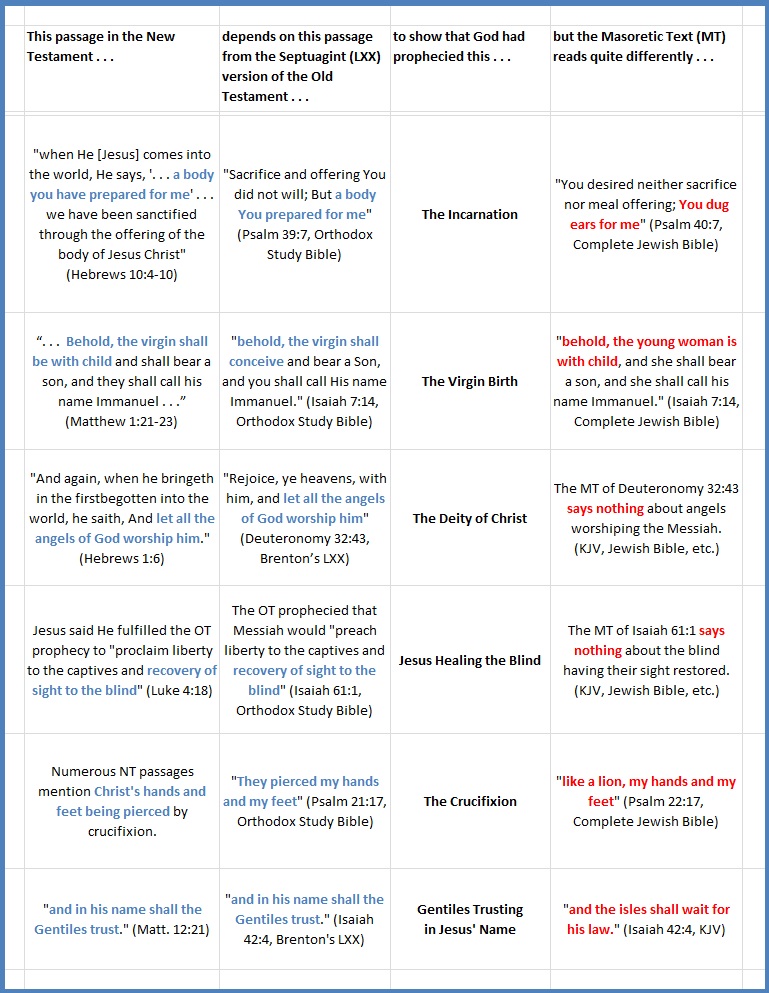- Dec 20, 2003
- 13,624
- 2,675
- Country
- Germany
- Faith
- Christian
- Marital Status
- Married
Most Christians want to be able to say that the bible they read contains the words that God originally inspired properly translated into the language of our times. But there are differences in bible versions based on which sources are prioritised.
The King James Bible is based to a considerable extent on the Masoretic Text. But the Orthodox tradition has used the Septuagint(LXX) much more. Syriac churches use the Peshitta. The discovery of the dead sea scrolls has given access to earlier versions of the Masoretic text and has given us a fourth way to test the verses given. It seems that there are errors in all 4 sources but on comparison we are able to find the original text.
The Masoretic text for example has been distorted by a desire to write Jesus out of the fulfilment of Messianic prophecies by antichristian Rabbis. So in Isaiah for example they wrongly translate the virgin will be with child as the young woman will be with child. By neutralising or rewording the prophecies used in the NT about Jesus they make their usage seem false and unfulfilled in him. But because earlier texts have now been discovered affirming these messianic prophecies this revisionism has lost all credibility. It may indeed be a major reason why so many Jews have been turning to Jesus.
The Orthodox LXX tradition misses off the prophecy in Jeremiah that talks about the restoration of the Levitical priesthood in Israel. (Jeremiah 33:14-26)
The discussion of which source we prioritise has a number of big implications:
1) Messianic prophecy
2) The status of Israel as a nation
3) Which books should be in the canon of scripture
4) The reliability of the bible text we use
Which modern bible best handles these discussions about source reliability and is the most accurate for Christians today to use?
The King James Bible is based to a considerable extent on the Masoretic Text. But the Orthodox tradition has used the Septuagint(LXX) much more. Syriac churches use the Peshitta. The discovery of the dead sea scrolls has given access to earlier versions of the Masoretic text and has given us a fourth way to test the verses given. It seems that there are errors in all 4 sources but on comparison we are able to find the original text.
The Masoretic text for example has been distorted by a desire to write Jesus out of the fulfilment of Messianic prophecies by antichristian Rabbis. So in Isaiah for example they wrongly translate the virgin will be with child as the young woman will be with child. By neutralising or rewording the prophecies used in the NT about Jesus they make their usage seem false and unfulfilled in him. But because earlier texts have now been discovered affirming these messianic prophecies this revisionism has lost all credibility. It may indeed be a major reason why so many Jews have been turning to Jesus.
The Orthodox LXX tradition misses off the prophecy in Jeremiah that talks about the restoration of the Levitical priesthood in Israel. (Jeremiah 33:14-26)
The discussion of which source we prioritise has a number of big implications:
1) Messianic prophecy
2) The status of Israel as a nation
3) Which books should be in the canon of scripture
4) The reliability of the bible text we use
Which modern bible best handles these discussions about source reliability and is the most accurate for Christians today to use?

